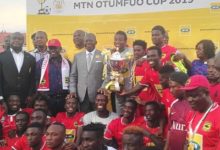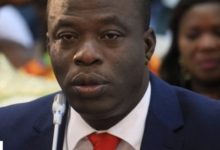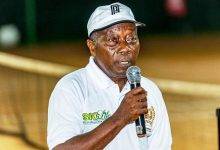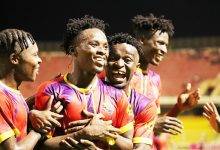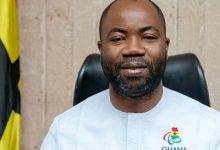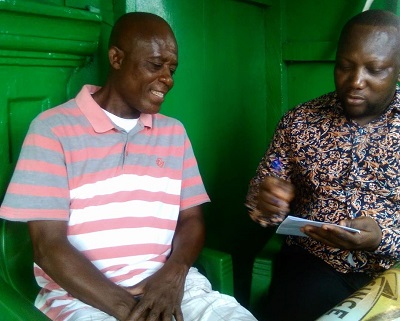
WITH bundles of natural skill and oozing silky moves, he was the jewel in many a football fan’s eye. He was one of the key reasons the Accra Sports Stadium was jammed to capacity on match days.
Indeed, his sweet tantalizing feet conjured up a stunningly wide variety of crosses – and his free-kicks were a unique trademark.
Nicknamed “Don Dada Diouf” – a reference to Senegalese forward El Hadji Diouf, owning to similar style of play and his dyed hair, Bernard Don Bortey (now 36) is not an amusing spectacle, as he makes life with corking sweat.
Though he claims he still has some great football stuck up in his body, it is limpidly clear from his posture that the staying-power that he freely possessed in his heyday is fast evaporating – if not gone with his age long ago.
“It’s not been easy at all. It’s pretty difficult, senior. We’re surviving only by the grace of God,” he told this writer, but insisted he would rise again.
Ghana’s football at the local level had been put on ‘ice’ since June 2018 after the FIFA/CAF Normalisation Committee took over, following Anas Aremeyaw Anas’ exposé on the rot in the nation’s football.
In the latter part of 2018, Bortey needed just GH¢200 to clear up the remainder of his mother’s medical bills and he had to virtually go cup-in-hand to friends and philanthropists to bail him out of the dire situation.
This is a star player who featured in 27 games for the Ghanaian national football team and scored nine times; the latest game being in the qualifying stage of the 2014 FIFA World Cup. He also represented Ghana in the 1999 FIFA U-17 World Championship in New Zealand, poking home three goals in six games.
Also known as the ‘Serial Killer’ during his halcyon days, the pacey winger also played in the African Champions League with Accra Hearts of Oak in 2001 and became Ghana’s Premier League joint goal-king in 2002.
The 2004 CAF Confederation Cup winner with Hearts, was also top-scorer of the 2012 Ghana League Clubs Association (GHALCA) Top Four tournament, earning himself many accolades and making thousands of cedis in the process. This was even before he had some stints with other domestic Premier League sides – Aduana Stars (2012) and New Edubiase (2013) as well as foreign clubs – Swedish second tier side Ange FI (2016) and Panthers FC of Equatorial Guinea in the same year.
“I didn’t make big money when playing for Hearts, though I wasn’t bad though,” he told me, holding out that lack of better management too let him down gravely.
“Perhaps, if I had had a management team as good as that of five-time world best Cristiano Ronaldo, I would have been on top of the world by now,” he lamented, advising today’s players to invest in their future “if the opportunity presents itself.”
True, Bortey may have been struggling now, thanks to off-the-pitch frailties, poor mismanagement of finances and bad advice – perhaps, indicating how a footballer’s career can be a relatively short one.
Former Hearts and Accra Great Olympics attacking left-back, Nii Noi Dowuona, is not faring any better financially. The longest serving inspirational Hearts captain (1992-1998), said “things are pretty tight now.”
“As I speak now, I don’t work and sometimes make a living through the benevolence of friends and family members. I know it’s not the best, but sadly, I don’t have a choice,”said the51-year-old star, who thanked God for having a supportive wife.
He lamented that top players, especially, most often than not, spend their earnings “as if there’s no tomorrow; but that’s a dangerous way to go.”
Arguably the longest-serving captain ofHearts, Nii Noi offered this admonition in an exclusive interview with the Times Sportsa few days ago.
“We’re struggling today because we failed to make any sound investment during our heyday.”
He said at the peak of his career in the mid-90s, he acquired two parcels of land which he had to sell later to enable his kid brother pursue his tennis career abroad.
According to the multi-talented defender, who will be 52 on November 2, this year, there is a good reason why players should adopt a more rigorous approach to personal finance, as the period of their peak earnings is often vanishingly brief.
“Players may be earning some good money now in their prime – guaranteeing a comfortable standard of living. But the challenges lurk in after they have hung up their boots,” said Dowuona, a father of six.
Also known in football circles as Alhaji Bello, Dowuona further advised young players to learn from other people’s experiences and misfortunes.
“It’s supremely important that they know where they’re coming from. They should know their goals and expectations and what they want to achieve in life. They should learn to invest even before they turn professional so that it can be easier for them when they do.”
He said the right temperament and advice, careful planning and a disciplined approach can bring players closer to the golden goal of a debt-free, fully invested retirement.
As captain, Nii Dowuona led Hearts to win three Premier League Cups between 1996 and 1998 and two Super Cups in 1997 and 1998.
One other ‘big’ player who pleaded anonymity, told this writer that he is now putting up with friends after he was thrown out by the landlord.He had everything going right for him before he abandoned football for women and booze.
“I wish the years would roll back; sadly it’s too late for me.”
He enjoyed life during his era. But the lavish lifestyle has come to bite him hard, having spent millions on luxury cars, women and booze.
Indeed, there is a litany of distressing tales of such big players in Ghana littering all over. It must be said, however, that not all cases of players in hardship have to do entirely with carelessness in the management of their savings.
The doleful case of former Kumasi Asante Kotoko, AshantiGold SC and Hearts’ central defender, Edward Agyemang Duah, may be an isolated case as he was struck by a bout of stroke – not too long after hanging his boots in 2002.
For fans of Hearts, Duah is a legend never to be forgotten, having played a key role in the club’s CAF Champions League victory in 2000. It was the club’s first biggest prize in Africa. That prodigious feat was to be followed by his club’s CAF Super Cup victory over Zamalek club of Egypt.
Agyemang Duah’s no-nonsense approach in the rear earned him the name ‘Rambo’ from the fans. He was rugged, unyielding, intrepid and aerially unstoppable.
The height of his rise was an invitation into the senior national team, Black Stars, where he featured in a number of games including the historic Ghana-Nigeria Japan/Korea 2002 qualifier in Accra on March 11, 2001.
With the overseas-based players being accused by fans of indiscipline and lacking full commitment to the national cause, a local coach Jones Attuquayefio took a bear-sized gamble and paraded the in-form Hearts team against a star-studded Nigeria Super Eagles side – featuring the likes of the much-dreaded Sunday Oliseh, Nwankwo Kanu, Tijjani Babangida, Augustine ‘Jay Jay’ Okocha, Finidi George and Julius Aghahowa.
It was a rare scene of beauty and sheer class watching Duah strip naked the ferocity of the marauding Nigerian attack – as shouts of ‘Rambo … Rambo … Rambo’ thundered around the Accra Sports Stadium with every single manoeuvre.
Sadly, few years after hanging his boots, he went into oblivion with his whereabouts unknown to many. Today, the hitherto fearlessly uncompromising defender, now rely on aides to move about freely as he battles cerebrovascular accident (stroke) that has confined him to his bed for the past five years and rendered him bankrupt.
“I have gone bankrupt now because of my present condition and that is even affecting me. I don’t have money to go for treatment, for physio and other therapy that will help me stand on my feet. Even my rent has become difficult for me to pay,” he said.
Commenting on his state of health, Rambo said “for a number of years now, one part of my body has gone numb – rendering me bedridden, but have seen some improvement in the last five months.”
Regrettably, Duah is supported only by his family, some church members and a few playing colleagues. Rambo’s condition was confirmed by the Chief Executive Officer (CEO) of Grace Homeopathic Clinic; Dr. Chester Bonnako, who has since been of great support to the player.
Dr Bonnako renewed calls for “sports people” to put in place retirement plans to forestall events of this nature.
Indeed, when players are young, they think their careers will never end. Sometimes, sporting careers come to an abrupt end due to injury. This is a major life change which is usually not planned for. In such bad situations, to what lengths do the clubs who benefited from their talents go to help them? Almost zero!
It is for this reason stars who attract massive crowds and huge audiences, must begin to think deep now and plan for their future.
Indeed, one question that players must continue to engage themselves with is that: when the final whistle blows and the adulation of the crowd fades in the distance, what happens to them? What happens when the lights go down and their fame fades?
Careful planning for what they are going to do for their second act is vitally important for the great majority of professional sportspeople, whose careers can be fleetingly brief – frighteningly short!
BY JOHN VIGAH

